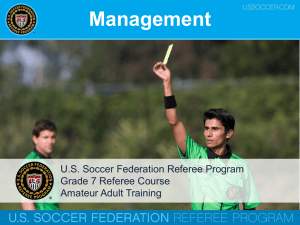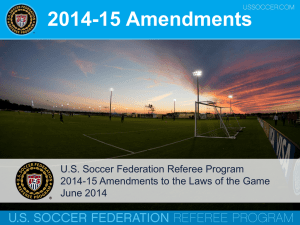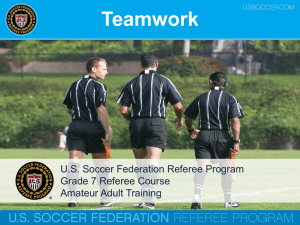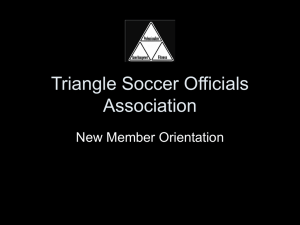dogso - ossrc
advertisement
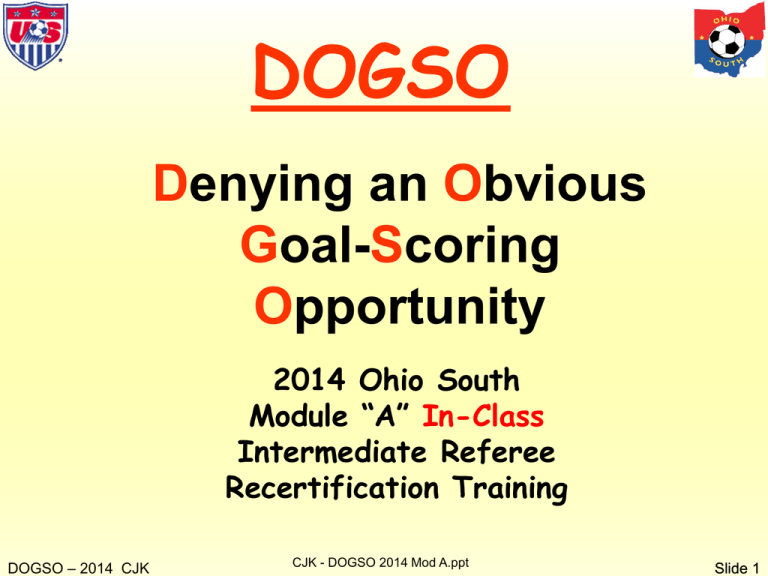
DOGSO Denying an Obvious Goal-Scoring Opportunity 2014 Ohio South Module “A” In-Class Intermediate Referee Recertification Training DOGSO – 2014 CJK CJK - DOGSO 2014 Mod A.ppt Slide 1 DOGSO Quiz 1. What are the 4 D’s a referee must consider before deciding a DOGSO has occurred? 2. Where on the field can a DOGSO occur? 3. Can the referee apply “advantage” when an opponent commits DOGSO? 4. Can a GK within the Penalty Area commit DOGSO by handling the ball? DOGSO – 2014 CJK Slide 2 DOGSO For a player to be sent-off for denying an "obvious goal-scoring opportunity”, all 4 the following elements MUST be present. These are called the 4 D’s. 1. 2. 3. 4. Number of Defenders Distance to goal Distance to ball Direction of play If any one element is missing, there can be no send-off for denying an obvious goal-scoring opportunity. Also … the presence of each of these elements must be "obvious" in order for the send-off to be appropriate. DOGSO – 2014 CJK Slide 3 DOGSO Quiz 1. What are the 4 D’s a referee must consider before deciding a DOGSO has occurred? 2. Where on the field can a DOGSO occur? 3. Can the referee apply “advantage” when an opponent commits DOGSO? 4. Can a GK within the Penalty Area commit DOGSO by handling the ball? DOGSO – 2014 CJK Slide 4 DOGSO In other words, as the referee, you must be able to answer YES to all of the following 4D questions … 1. Defenders? Did the area between the attacker and the goal have fewer than two nearby defenders who were able to become involved? 2. Distance to Goal? Was the foul committed near the goal? The farther from goal, the less likely it is that an “obvious” goal scoring opportunity existed. 3. Distance to Ball? Was the ball within a reasonable distance to the attacker playing the ball? 4. Direction of attack? Was the attacker running directly towards the goal? (and not away from the goal at an angle – e.g. towards the corner flag). DOGSO – 2014 CJK Slide 5 DOGSO As the referee, you must also be able to answer YES to these questions as well …. 5. Did the attacker have a reasonable chance for a shot on goal, or to make progress towards the goal, without being challenged by another nearby defender? 6. Was the ball still in play when the foul was committed? (e.g., did the referee call offside just before the foul was committed?) If the answer to all 6 of these questions is YES – then it most likely a DOGSO offense has occurred. DOGSO – 2014 CJK Slide 6 DOGSO Quiz 1. What are the 4 D’s a referee must consider before deciding a DOGSO has occurred? 2. Where on the field can a DOGSO occur? 3. Can the referee apply “advantage” when an opponent commits DOGSO? 4. Can a GK within the Penalty Area commit DOGSO by handling the ball? DOGSO – 2014 CJK Slide 7 DOGSO Also Remember… • If the referee makes use of advantage during an obvious goal-scoring opportunity and a goal is scored directly, despite the defender committing an infraction, it’s not DOGSO – the defender cannot be sent off for that reason, but … could still be cautioned for the attempt …. or could be sent-off due to the severity of the foul DOGSO – 2014 CJK Slide 8 DOGSO Quiz 1. What are the 4 D’s a referee must consider before deciding a DOGSO has occurred? 2. Where on the field can a DOGSO occur? 3. Can the referee apply “advantage” when an opponent commits DOGSO? 4. Can a GK within the Penalty Area commit DOGSO by handling the ball? DOGSO – 2014 CJK Slide 9 DOGSO Point of Note … • Law 12 states specifically “denying the opposing team a goal for an obvious goal-scoring opportunity by deliberately handling the ball does not apply to the GK within their own penalty area.” DOGSO – 2014 CJK Slide 10

